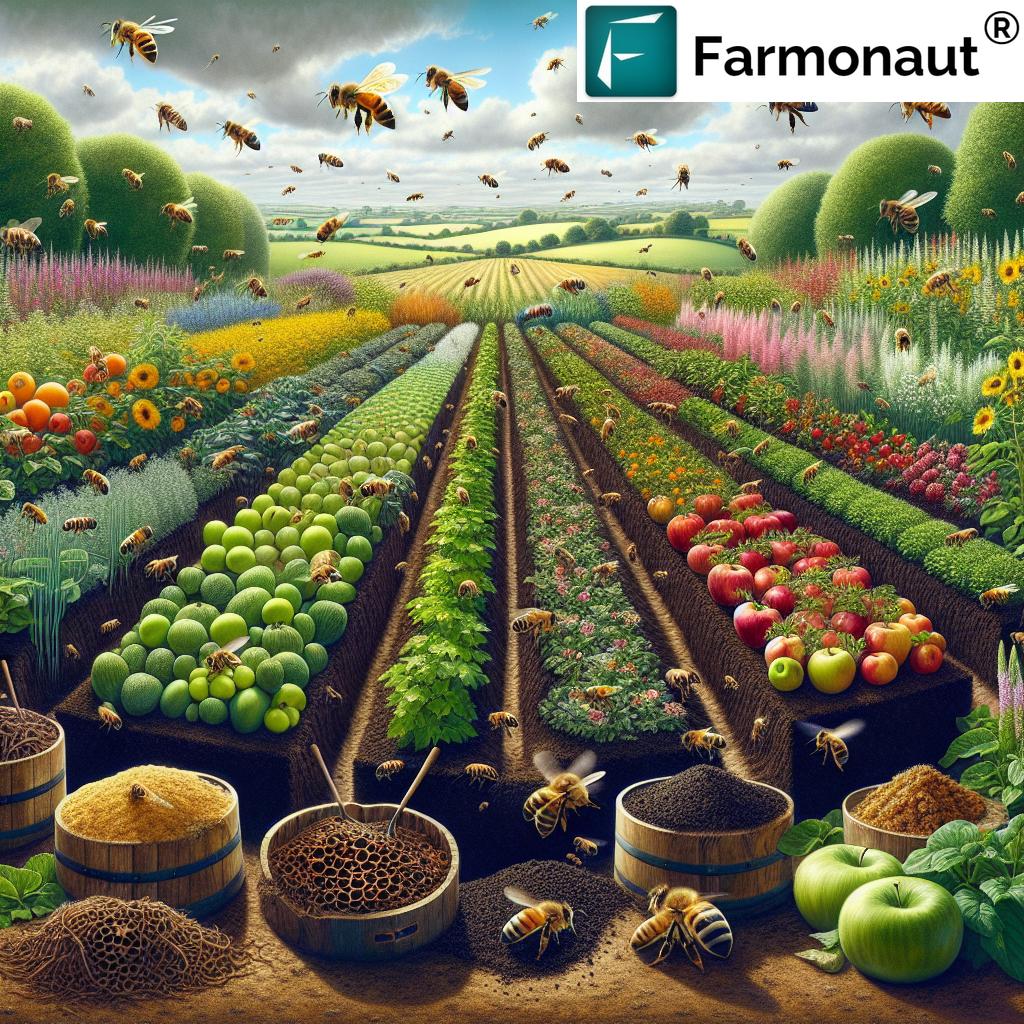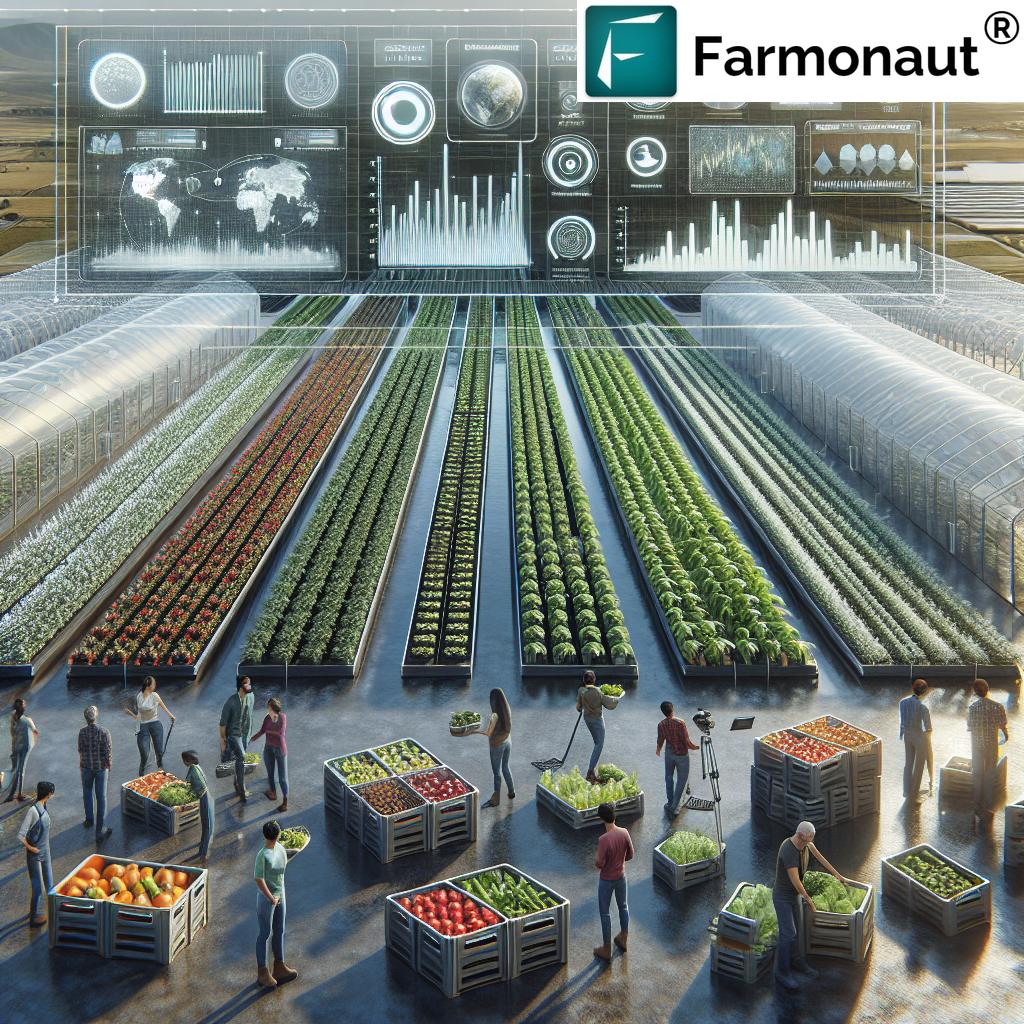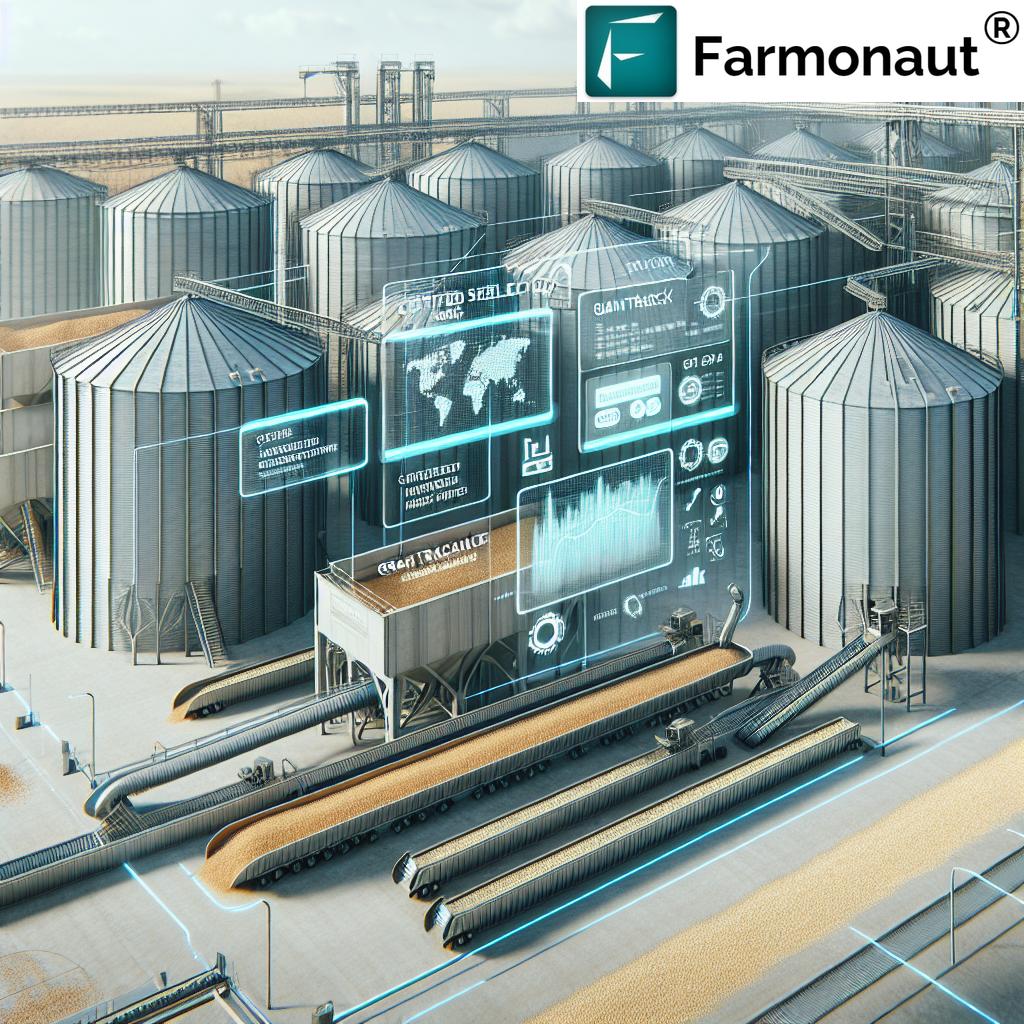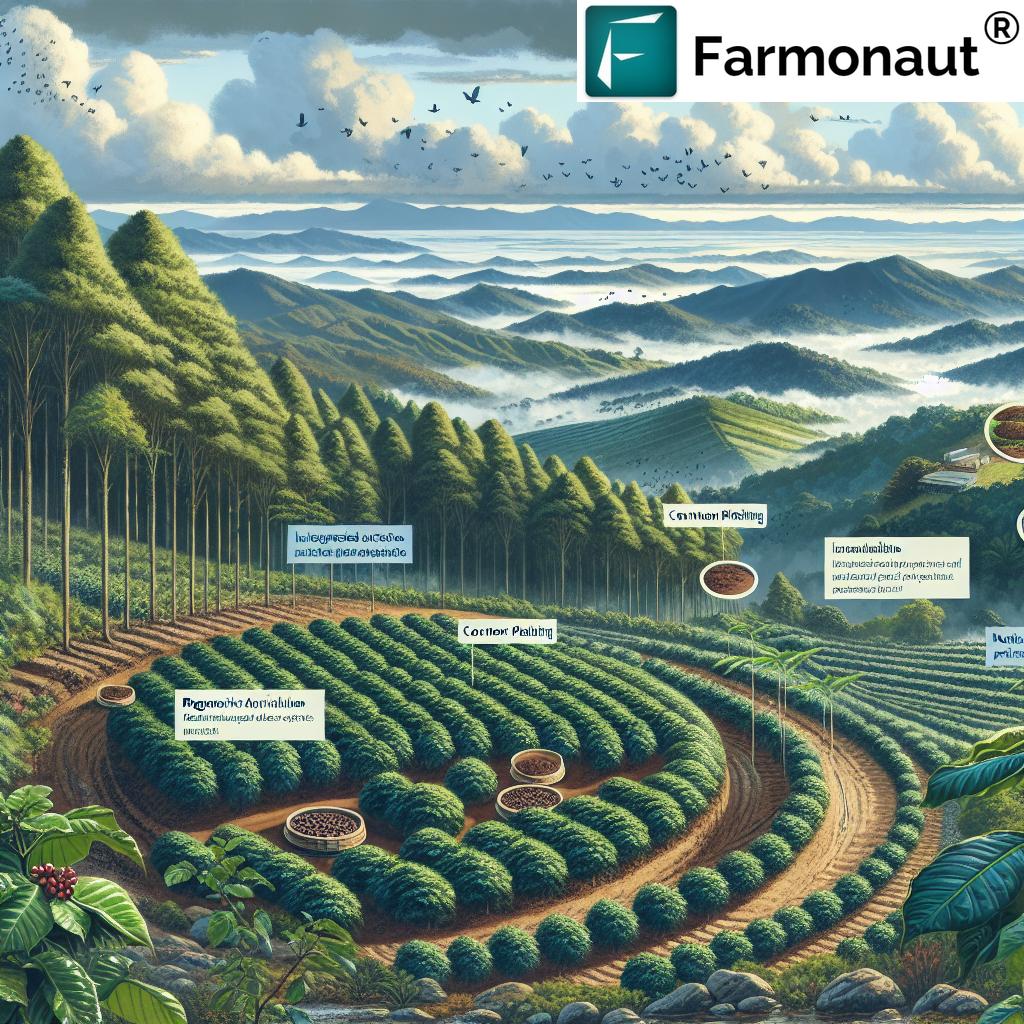How Does Beekeeping Contribute to Sustainable Agriculture? | Unlocking Ecological & Economic Benefits
Table of Contents
- Introduction
- Enhancing Pollination and Crop Yields
- Supporting Biodiversity and Ecosystem Health
- Improving Soil Health and Fertility
- Economic Resilience and Livelihoods
- Promoting Sustainable Practices and Education
- Integrating Beekeeping into Agroecological and Integrated Farming Systems
- Estimated Benefits of Beekeeping Practices in Sustainable Agriculture
- Empowering Sustainable Beekeeping with Farmonaut’s Agritech Solutions
- FAQ: How Does Beekeeping Contribute to Sustainable Agriculture?
- Conclusion
“Bees pollinate about 75% of leading global food crops, directly supporting sustainable agriculture and food security.”
Introduction: The Vital Link Between Beekeeping and Sustainable Agriculture
Sustainable agriculture is at the forefront of global efforts to ensure food security, ecological balance, and economic resilience. Across agricultural systems worldwide, the pursuit of eco-friendly, high-productivity farming methods grows more urgent with each passing season. Central to this endeavor is a deceptively simple, yet absolutely essential, contributor: the bee.
But how does beekeeping contribute to sustainable agriculture? The answer encompasses an intricate web of ecosystem services, from pollination and increased crop yields to enhanced biodiversity, improved soil health, and significant economic benefits for rural communities. This blog post delves deep into the benefits of beekeeping for agriculture, exploring not just the science, but also the nature-positive practices that drive our food systems toward greater sustainability.
Join us as we uncover comprehensive answers to: why are bees and beekeepers so important for ecosystem health, productive land, and thriving communities—and how do we make these practices scalable, affordable, and accessible for everyone, using advanced technology like that provided by Farmonaut?
Enhancing Pollination and Crop Yields: The Foundation of Productive, Sustainable Farms
Pollination by bees is the lifeblood of agriculture—a system that sustains not just our food but the environmental health upon which we all rely. Bees are essential pollinators for nearly 35% of global agricultural land, directly supporting the production of 87 of the world’s top food crops (FAO). Their pollination activities do far more than boost plant fertility. They:
- Increase crop yields, especially in fruits such as blueberries, cherries, and watermelons, which rely on natural bee pollination for higher and better quality harvests.
- Enhance quality and shelf-life of produce due to more complete fertilization and improved size, shape, and nutritional density.
- Reduce dependence on chemical interventions by reducing the need for synthetic pollination alternatives, thus supporting environmentally friendly agriculture.
- Support robust ecosystem services, reinforcing crop resilience and creating a positive feedback loop for farming outcomes.
For instance, in crops like blueberries, cherries, and watermelons, studies demonstrate significant increases in crop yields—sometimes by up to 30%—when bee populations are well managed. This underscores how integrating sustainable beekeeping practices directly supports both high yield and sustainable agricultural systems.
“Sustainable beekeeping can increase crop yields by up to 30%, enhancing both biodiversity and farm profitability.”
This deep integration has allowed agricultural regions to not only maintain, but also to grow their capacity for global food production in a sustainable manner. In summary, pollination and crop yields represent the pivotal link in the intricate nexus between beekeeping and sustainable agriculture.
Beekeeping and Biodiversity: Supporting Diverse Ecosystem Health
The relationship between beekeeping and biodiversity is foundational for resilient, thriving ecosystems. As bees visit myriad flowers and plant species daily, their pollination services:
- Support a variety of plant species, cultivating diversity within farmland and adjacent habitats (e.g., forest margins, wildflower meadows, hedgerows).
- Facilitate genetic diversity within and between plant populations, improving plant survival and adaptation capabilities.
- Establish robust habitats for wildlife, from insects to birds and small mammals—all benefitting from a variety of plants facilitated by bees’ pollination activities.
- Help maintain ecological balance and enhance the survival of at-risk species.
Beekeeping as a tool for conservation is not limited to honeybee hives: sustainable practices like planting wildflower meadows, establishing hedgerows, or preserving natural habitats all support the necessary corridors and food sources for a diversity of pollinator and animal species. This synergistic ecosystem effect offers substantial benefits to rural communities, protecting watersheds and helping control soil erosion. (ResearchGate)
- Healthy pollinator populations = increased resilience and long-term soil and crop productivity.
- Biodiverse farmlands are more resistant to disease, pests, and climatic stressors, thereby offering greater resilience to shifting global conditions.
This cycle is self-reinforcing—diverse plants attract and support robust bee populations, while bees enable the reproduction and spread of those same plants. It is within this delicate equilibrium that beekeeping’s true value for ecosystem health is realized.
Improving Soil Health Through Beekeeping
Among the most underrated benefits of beekeeping for agriculture is its role in improving soil health and fertility. Bees, through their pollination efforts, not only spread seeds, but promote:
- The growth of a diverse array of plants with varied root structures.
- Enhanced root aeration and water infiltration, reducing the risk of erosion and surface runoff.
- Improved nutrient cycling as plant biodiversity increases the movement of nutrients through the soil profile.
- Reduced dependency on synthetic fertilizers, since thriving, biodiverse plant life naturally enriches soil structure and fertility.
- Long-term soil productivity and carbon sequestration, both critical to fight climate change.
For example, the enhanced root systems of a variety of crops and wildflowers provide greater stability, more organic matter, and in many cases, natural control of consistent water supply. This creates soils that are more resilient to drought, more productive over the long term, and less likely to degrade—supporting sustainable agriculture at its core. (BeekeepGuide)
Moreover, integrating tools such as Farmonaut’s carbon footprinting solutions provides farmers with vital data on soil organic carbon—allowing for smarter management and maximizing the ecosystem benefits arising from sustainable beekeeping practices and crop rotation.
Economic Benefits of Beekeeping & Resilience for Rural Communities
The economic benefits of beekeeping extend far beyond the sale of honey, beeswax, and propolis. In fact, beekeeping for rural development and sustainable economic growth is a proven pathway towards increased farm income, job creation, and community resilience.
- Beekeeping diversifies income sources, reducing reliance on a single crop or market.
- Products like honey and beeswax serve local and international markets, broadening economic opportunities for farming families.
- Employment opportunities grow, especially in rural communities, promoting sustainable development and contributing to poverty reduction.
- Beekeeping requires minimal land and water input, making it accessible even to those without large landholdings.
- Integrated operations also lead to improved crop yields (by up to 30%), indirectly raising farm profitability.
For example, countries like Slovenia have incorporated beekeeping into their rural and agricultural strategies, resulting in more sustainable land management and robust local economies. (ResearchGate)
Furthermore, platforms like Farmonaut’s crop loan and insurance services empower farmers by improving credit access while reducing fraud, helping communities maintain the financial resilience necessary for long-term sustainability.
Promoting Sustainable Practices and Education via Beekeeping
Promoting sustainable agriculture begins with education and the adoption of best management practices. Sustainable beekeeping practices naturally encourage:
- Minimizing pesticide use and favoring environmentally friendly alternatives, thereby safeguarding both agricultural production and pollinator health.
- Conserving natural habitats—beekeepers are motivated to protect diverse plants, water sources, and nesting sites essential for bee populations and other wildlife.
- Community education, as beekeepers run workshops and outreach programs that increase understanding of pollinator importance, sustainable farming methods, and environmental conservation.
These educational initiatives do not merely benefit local farming communities; they ripple outward, increasing consumer awareness and supporting global biodiversity conservation efforts. By maintaining open channels between beekeepers, farmers, and the public, these practices build the shared commitment necessary for regenerative agriculture and enduring food security.
Explore how local honey farms impact communities by fostering education and stewardship.
For larger organizations, using integrated tools like Farmonaut’s blockchain-based product traceability ensures transparent, ethical sourcing of bee products—vital for building consumer trust in a sustainability-driven marketplace.
Integrated Farming Systems with Beekeeping: Enhancing Ecosystem Resilience with Bees
To fully unlock the benefits of beekeeping for sustainable agriculture, integrating beekeeping into agroecological and diversified farming systems offers the optimal path forward. Here’s how:
- Agroecological systems use crop rotation and seasonal planting techniques to maintain a constant source of nectar and pollen for bees, improving both pollinator and crop health.
- Farmers can select diverse crops (grains, fruits, legumes, and wildflowers) that collectively support healthy bee populations throughout the year.
- By reducing external inputs (like synthetic fertilizers and pesticides), these systems lower costs, increase environmental resilience, and promote sustainable yields.
- Integrated beekeeping supports natural pest control by fostering predator and pollinator species, further reducing the need for chemical interventions.
Find more on this topic at Beekeeper Corner.
It’s clear: beekeeping and integrated farming systems are mutually reinforcing, promoting better ecosystem balance, higher farm productivity, and environmentally friendly agriculture. For global agriculture, this means: more reliable food systems, less environmental degradation, and healthier communities.
On an operational level, sophisticated tools like Farmonaut’s platform for large-scale farm and resource management enable seamless integration, continuous monitoring, and precision resource allocation—maximizing yields while minimizing environmental footprints.
Estimated Benefits of Beekeeping Practices in Sustainable Agriculture
| Key Area | Description of Benefit | Estimated Impact (%) |
|---|---|---|
| Pollination | Enhanced crop pollination across 35% of global agricultural land | 70–80% improvement |
| Crop Yields | Increase in yield in bee-pollinated crops | 20–30% |
| Biodiversity | Number of plant species supported by bee pollination | +10–15 species |
| Soil Health | Reduction in synthetic fertilizer and chemical input use due to improved natural plant diversity and soil quality | 10–20% reduction |
| Economic Impact | Average increase in farm income credited to bee-related activities | 15–30% increase |
Empowering Sustainable Beekeeping with Farmonaut’s Agritech Solutions
At Farmonaut, we believe modern technology plays a vital role in scaling the benefits of beekeeping for agriculture globally. By integrating data-driven, satellite-based solutions, our mission is to:
- Make precision agriculture—incorporating beekeeping—more affordable and accessible worldwide through easy-to-use Android, iOS, and web platforms.
- Leverage satellite-based crop and soil monitoring to provide farmers with real-time insights for optimal planting, irrigation, and resource decisions—directly supporting environmentally positive outcomes from bees’ pollination.
- Power up AI-driven advisory systems (Jeevn AI) that analyze weather, soil, and crop health to improve productivity and reduce input wastage. This is especially important for managing integrated farming systems with beekeeping components.
- Introduce blockchain-based traceability tools to the agricultural and food sectors, enabling secure proof-of-origin for honey and bee products, and creating end-to-end transparency for ethical, sustainable supply chains.
Explore more at Farmonaut Traceability Solutions. - Empower fleet, resource, and large-scale farm management to synchronize multi-crop operations, water management, and machinery allocation, reducing environmental footprints and maximizing ecological resilience.
Learn about the Farmonaut Fleet Management system for agribusinesses.
Our commitment is to ensure that every farmer, beekeeper, and agri-business—from India to Slovenia to Africa and the Americas—has access to the insights and tools they need for more productive, environmentally conscious farming, leveraging the synergistic benefits of integrating beekeeping into sustainable agriculture.
Interested in integrating these solutions?
→ Try Farmonaut Platform now |
→ Explore the API |
→ API Developer Docs
FAQ: How Does Beekeeping Contribute to Sustainable Agriculture?
- 1. Why are bees considered essential pollinators for agriculture?
- Bees are unmatched in their capacity for natural pollination—supporting 35% of global agricultural production and directly influencing the yields and quality of diverse crops such as fruits, vegetables, and nuts.
- 2. How does beekeeping improve soil health?
- Through the pollination of a diversity of crops and wild flowers, beekeeping fosters better root systems, promotes nutrient cycling, increases soil organic matter, and reduces the need for synthetic fertilizers—all vital for resilient soil systems.
- 3. Are there economic advantages to integrating beekeeping into farming?
- Yes, sustainable beekeeping provides diversified income streams from honey and beeswax products, enhances farm yield, and offers new employment opportunities—directly supporting the economic resilience of rural communities.
- 4. What are “sustainable beekeeping practices”?
- These include habitat conservation, pesticide minimization, planting pollinator-friendly crops, responsible hive management, and educational outreach aimed at supporting both biodiversity and productive agriculture.
- 5. How can technology like Farmonaut’s support sustainable beekeeping?
- Farmonaut’s satellite-based, AI-powered platform delivers precision insights on crop health, soil condition, and resource management, enabling farmers to optimize outcomes from practices like beekeeping while monitoring environmental impacts in real time.
Conclusion: Beekeeping and the Road to Sustainable, Productive Agriculture
Beekeeping is so much more than a livelihood—it is the beating heart of sustainable agriculture! By enhancing pollination and crop yields, supporting biodiversity and soil health, driving economic resilience, and promoting sustainable practices, the world’s beekeepers represent the vanguard of agro-ecological progress.
Integrating beekeeping into farming systems—especially with the aid of platforms like Farmonaut—means not only richer harvests and thriving rural communities, but a more sustainable, environmentally friendly future for all. Whether you’re a farmer, policymaker, agritech developer, or advocate for a healthier planet, your support is crucial for protecting bees, empowering regenerative agriculture, and ensuring sustainable food supplies worldwide.
Ready to take the next step toward sustainable agricultural excellence?
→ Get started with Farmonaut today and help drive the beekeeping revolution for a resilient, productive, and ecologically balanced agricultural landscape!

















